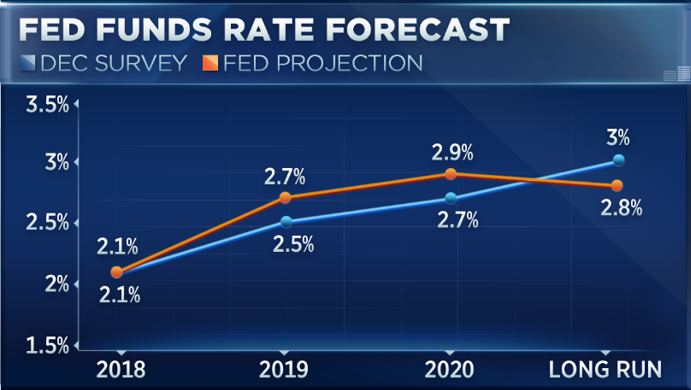The new Federal Reserve boss will be the same as the old boss when it comes to monetary policy and President Donald Trump‘s tax cuts will pass and add half a point to growth.
Those are among the findings of this month’s CNBC Fed Survey, coming at a time of dramatic transition at the Federal Reserve and in fiscal policy in Washington.
“Huge regime change in tax, monetary, trade is underway; that makes forecasting very prone to large error terms,” wrote David Kotok, chairman and chief investment officer at Cumberland Advisors, in response to the survey.
The 44 respondents, including money managers, strategists and economists are nearly unanimous in believing the Fed will hike interest rates at the end of its two-day meeting this Wednesday and 100 percent say the next move after Wednesday will be to raise rates. Two-thirds say that next hike will happen in March.
“This should be the easiest FOMC meeting as we say goodbye to Yellen and hello to Powell with a rate hike and a reaffirmation of the plan to unwind the balance sheet,” wrote John Donaldson, director of fixed income, Haverford Trust. “No surprises, no drama. At some point, Powell will look back and wonder why all the meetings couldn’t have been just like the first.”
The Fed is seen hiking 2.8 times, on average, next year (call it three), with the funds rate rising to just over 2 percent, and then increasing to 2.5 percent in 2019. The Fed is estimated to stop hiking in 2019 at a rate of 2.9 percent.

About three-quarters of respondents expect Jerome Powell, Trump’s nominee for Fed chairman, to pursue about the same policies as outgoing Fed Chair Janet Yellen. A fifth expect him to be more hawkish. But Powell will have to prove his bona fides. Yellen was rated stronger than Powell in six of eight categories, including monetary policy, leadership and economic expertise. Powell is viewed as stronger than Yellen in market knowledge and regulatory expertise. Respondents give Yellen’s tenure a B+.
“Kudos to Yellen on her way out the door. I’ll admit to being surprised, but she has proven to be a very capable Fed Chair,” said John Kattar, chief investment officer, Ardent Asset Management.
The survey found that market participants believe Trump’s two other appointees, Fed Governor Randy Quarles and Carnegie Mellon economist Marvin Goodfriend, who was only recently nominated, are viewed as generally more hawkish than the current Fed policy consensus.

The outlook for monetary policy appears to hinge on the fate of tax cuts. Just over 70 percent think the tax cuts will pass this year, with about a quarter saying next month. On average, respondents see the tax cuts boosting growth by roughly a half point this year and next and a similar amount over the average 10-year life of the tax cut plan.
“The Fed’s desire to raise interest rates absent inflation is risky, but they could be bailed out by real tax reform,” wrote Kevin Giddis, head of fixed income capital markets, Raymond James Financial.
Stuart Hoffman, senior economic advisor at PNC Financial, doesn’t believe that the Fed will accelerate policy because of the tax cuts. John Ryding of RDQ calls corporate tax cuts “the jewel in the crown of the tax plan” and says they will boost capital spending and productivity. But Joel Naroff of Naroff Economic Advisors says, “The sugar high from tax cuts may make 2018 look good but it will likely hasten the onset of the next recession.”
That’s a minority view. With tax cuts on the way, and better recent growth numbers, respondents look for year-over-year GDP to accelerate to near 3 percent in 2018 and 2019, (2.85 percent to be exact for both years) and inflation to only tick up to 2.5 percent by 2019.
At 14.9 percent, the chance of recession in the lowest it’s been in about 2.5 years. Tax and regulatory policies and global economic weakness remain the biggest threats to the U.S. expansion.
Source: cnbc economy
Fed Survey: Tax cuts and rate hikes on the way